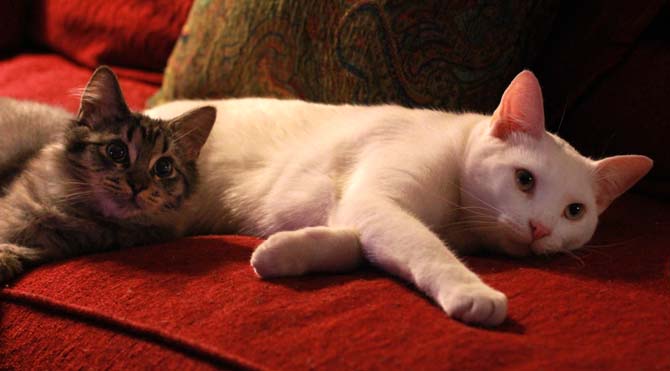In the midst of bad economic times where even professional businessmen and women are suffering losses, students may not feel like they have a chance to be successful in the business realm. Seniors Barton Strawn, Jordan Pung and Justin Carey, however, have ignored the naysayers and started their own brand, Lumina Clothing Company, which markets skinny ties and bow ties toward young adults.
The entrepreneurs thought of the idea for the company after realizing they were all tired of buying bulky, large ties that didn’t mesh with the overall look they wanted to convey.
“We were joking around one day, talking about how we could make ties that would look the way we wanted them to,” Strawn, a senior in architecture, said. “I decided to try to sew a tie and it actually turned out pretty good. We decided to go for it from there.”
The students’ brand, Lumina Clothing Company, sells skinny ties and bow ties in a variety of designs and colors. Strawn has given up his job as chief tailor, but the ties are still hand-sewn in Raleigh.
Strawn said the majority of the company’s ties are sold online, although it sells its products in one store in Cameron Village, Wardrobbe, and it hopes to expand to more stores this spring.
“We try to sell nice products at a price cheaper than other people sell them for,” Strawn said. “Our ties sell for $68 plus shipping and handling, while other companies are selling similar products for $120 and up.”
Lumina plans to launch a new campaign this spring with the goal of persuading more stores to sell their products.
“It’s hard in the current business climate — you have to put in a little extra effort,” Pung, a senior in biomedical engineering, said. “But our products are not really like anything else out there right now.”
One of Lumina’s goals is to remain a North Carolina based company by having the products made in the state, Strawn said. The company hopes to be a philanthropic business by partnering with non-profits on local, state and national levels.
“Barton and I have been co-chairs of the Krispy Kreme Challenge for the past two years, so we hope to partner with the KKC’s philanthropic partner, the N.C. Children’s Hospital, in the future,” Pung said. “We would like to do something for non-profit organizations in a non-traditional way.”
The company is unique in that it mixes Southern and Northern fashion, according to Strawn.
“Fashion in the South is progressing, maybe not extremely quickly, but still progressing,” Strawn said. “Lumina mixes the idea of skinny ties, which are usually worn in the North, with Southern designs and colors.”
The students both said balancing a business and school was a challenging but rewarding experience. Being chairs of the Krispy Kreme Challenge improved their team building, organizational and leadership skills, according to Pung.
“The KKC helped give us a business mindset and give us a taste of what dealing with companies and people is like,” Pung said. “We have found that although you can learn a lot from business classes, there’s nothing that beats trial-and-error, getting real experience.”
Lewis Sheats, adjunct lecturer in management, innovation and entrepreneurship, said a down economy could be a perfect time for entrepreneurs to capitalize on new opportunities.
“Opportunities come to the forefront in a poor economy,” Sheats said. “Entrepreneurs who are willing to take risks have a good chance of being successful in the future if they take advantage of this time.”
Sheats said students who want to start their own businesses should try to gain experience, develop a concept and plan ahead of time.
Other students are following suit and embracing the entrepreneurial spirit. Johnaustin Chapman, a senior in business with a concentration in entrepreneurship, started his own business, Lussuoso Custom Jewelry, to make jewelry suited to individual tastes.
“I’ve been making jewelry for myself since 2001, and one day I figured, why not share with others?” Chapman said.
Chapman describes being an entrepreneur as “being a self-motivated visionary that only finds failure in not trying.” He gives these words of advice to students thinking about starting a business: “trust your gut” and “the harder you work, the luckier you get.”
The Lumina founders encourage University students to try entrepreneurship ventures even in bad economic times. Strawn said there are a lot of factors to consider in starting a business, many of which he didn’t originally anticipate. Promotion, design, management, image and product materials all play into the company’s day-to-day operations.
“Don’t be naïve about the success rates — four out of 10 entrepreneurial companies fail — but my best advice is to go for it,” Strawn said. “It takes work and time, but if you are committed you will get something out of it, whether it’s success or business skills you can use in the future.”




